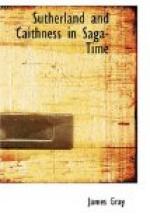[Footnote 20: F.B., ch. 183, 184.]
[Footnote 21: Tudor, Orkney and Shetland, p. 336.]
[Footnote 22: Torf. Orc., p. 25, “facile de alieno largientis.”]
[Footnote 23: F.B., 115. O.P., 783. F.B., 186. O.S., 10, 11. O.S., 8. Skene, Celtic Scotland, i, 374-9.]
[Footnote 24: Dalrymple, Collections, p. 99.]
[Footnote 25: Viking Society, Orkney and Shetland Folk, 1914, p. 5.]
[Footnote 26: O.P., (Canisbay), vol. ii, 794, 816.]
[Footnote 27: O.S., 11.]
[Footnote 28: B.N., c. 85.]
[Footnote 29: O.S., 12. F.B., 187. The F.B. makes the scene of this battle Skitten Moor.]
[Footnote 30: F.B., 187.]
[Footnote 31: Thorgisl, I, 4. (Orig. Islandicae, ii, p. 635.) In The Old Statistical Account (Tongue) there is a tradition of such a fight on Eilean nan Gall at the entrance to the Bay of Tongue, then in Caithness.]
[Footnote 32: p. 23.]
[Footnote 33: See Sir Wm. Fraser’s Book of Sutherland, and Pedigree in Appendix. There is a Craig Amlaiph (Olaf) above Torboll and Cambusmore (both in Cat) near the Mound in Sudrland. There were no Thanes of the De Moravia line in Sutherland.]
[Footnote 34: See The Pictish Nation and Church, pp. 129-32, and 341.]
[Footnote 35: See Darratha-liod, published by the Viking Club, 1910.]
[Footnote 36: Burnt Njal, c. 151.]
[Footnote 37: Iceland accepted Christianity by a vote of its Thing in 1000 A.D. “Blood” often fell in Iceland; after a volcanic eruption, rain was tinged with red.]
[Footnote 38: Tudor, O. and S., p. 20.]
[Footnote 39: Rods used for dividing and pressing downwards.]
[Footnote 40: See Scandinavian Britain (Collingwood), p. 256-7, where Mr. Gilbert Goudie’s Antiquities of Shetland is referred to.]
CHAPTER IV.
[Footnote 1: Reg. Morav., p. xxiv, and Charter No. 264, p. 342.]
[Footnote 2: Dunbar, Scottish Kings, pp. 4-7.]
[Footnote 3: Some authorities hold that Macbeth was the son of a sister of Malcolm. His property was probably in Ross and Cromarty. See also Rhys’ Celtic Britain, p. 196.]
[Footnote 4: Skuli was first Earl of Caithness, which then included Sutherland, see ante, but he was Norse.]
[Footnote 5: O.S., 16.]
[Footnote 6: Trithing—the same word as Riding in Yorkshire, one-third. See Scot. Hist. Review, Oct. 1918. J. Storer Clouston. Ulfreksfirth is Larne Bay.]
[Footnote 7: O.S., 17, 18.]
[Footnote 8: O.S., 20, 21, and St. Olaf’s Saga, cix.]




